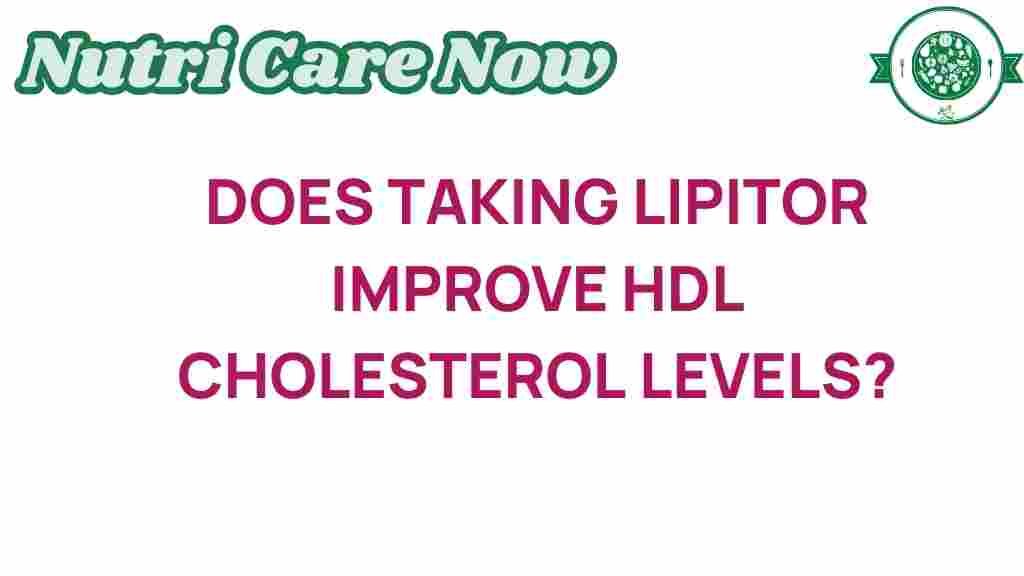Unraveling the Mystery: Does Lipitor Really Boost HDL Cholesterol?
Cardiovascular health is a major concern for many individuals, particularly those at risk of heart disease. One of the medications frequently discussed in relation to heart health is Lipitor, a statin used to lower cholesterol levels. This article explores the relationship between Lipitor and HDL cholesterol, aiming to unravel the mystery surrounding its effects on cholesterol levels and overall heart health.
Understanding Cholesterol and Its Types
Before diving into the specifics of Lipitor and its impact on HDL cholesterol, it’s essential to understand cholesterol and its different types:
- Low-Density Lipoprotein (LDL): Often referred to as “bad” cholesterol, high levels of LDL can lead to plaque buildup in arteries, increasing the risk of heart disease.
- High-Density Lipoprotein (HDL): Known as “good” cholesterol, HDL helps remove LDL cholesterol from the bloodstream, thereby supporting cardiovascular health.
- Total Cholesterol: This is the overall amount of cholesterol in your blood, including both LDL and HDL.
Maintaining a healthy balance between these types is crucial for optimal cardiovascular health.
What is Lipitor?
Lipitor (atorvastatin) is a prescription medication belonging to the statin class of drugs. It is primarily prescribed to:
- Lower LDL cholesterol levels
- Reduce the risk of heart attacks and strokes
- Improve overall lipid profile
Statins work by inhibiting HMG-CoA reductase, an enzyme involved in cholesterol production in the liver, leading to decreased levels of LDL cholesterol.
The Role of HDL Cholesterol in Heart Health
HDL cholesterol plays a critical role in maintaining heart health. Here’s how:
- **Reverse Cholesterol Transport:** HDL cholesterol helps transport LDL cholesterol away from the arteries and back to the liver, where it can be processed and eliminated.
- **Anti-inflammatory Properties:** Higher levels of HDL are associated with reduced inflammation in the cardiovascular system.
- **Protective Effects:** Adequate HDL levels are linked to a lower risk of heart disease and other cardiovascular conditions.
Given these protective effects, many people wonder whether Lipitor can effectively boost HDL cholesterol levels.
Does Lipitor Increase HDL Cholesterol?
Research on the efficacy of Lipitor in increasing HDL cholesterol levels has yielded mixed results. While statins like Lipitor are effective in lowering LDL cholesterol, their impact on HDL cholesterol is generally modest.
- Studies Indicate: Some studies suggest that statins can increase HDL cholesterol levels, but the increase is often not significant.
- Variability: The response to Lipitor can vary among individuals, with some experiencing a slight increase in HDL, while others may see no change.
- Focus on LDL Reduction: The primary benefit of Lipitor lies in its ability to lower LDL cholesterol, which is crucial for reducing cardiovascular risk.
Therefore, while Lipitor may contribute to a better lipid profile overall, its role in boosting HDL cholesterol specifically may not be as pronounced as some patients hope.
How to Optimize HDL Cholesterol Levels
If you are taking Lipitor or any other statin and are concerned about your HDL cholesterol levels, consider the following strategies to naturally boost HDL:
- Regular Exercise: Engaging in aerobic exercise can significantly increase HDL cholesterol levels.
- Healthy Fats: Incorporate healthy fats, such as those found in olive oil, fatty fish, and avocados.
- Quit Smoking: If you smoke, quitting can improve HDL levels.
- Moderate Alcohol Intake: Some studies suggest that moderate alcohol consumption may enhance HDL cholesterol levels.
Combining these lifestyle changes with your medication can improve your overall lipid profile and support heart health.
Medication and Drug Efficacy
When considering medications like Lipitor, it’s essential to understand their drug efficacy and how they fit into a broader heart health strategy. Here are some key points:
- Regular Monitoring: Regular blood tests to monitor cholesterol levels will help assess the efficacy of Lipitor and determine if adjustments are needed.
- Consult Your Doctor: Always consult your healthcare provider about any concerns regarding your medication or its effects on your cholesterol levels.
- Combination Therapies: In some cases, combining Lipitor with other treatments may yield better results for cholesterol management.
Staying informed about your treatment options and actively participating in your health care can lead to better outcomes.
Potential Side Effects of Lipitor
While Lipitor is effective for many individuals, like all medications, it can cause side effects. Common side effects include:
- Muscle pain or weakness
- Digestive issues, such as diarrhea or constipation
- Liver enzyme changes
- Increased blood sugar levels
It’s important to discuss any side effects you experience with your doctor, as they can help determine the best course of action for your treatment.
Conclusion
In conclusion, Lipitor is a widely used statin that primarily focuses on lowering LDL cholesterol and improving overall cholesterol levels. While it may have a modest effect on increasing HDL cholesterol, the primary benefits are in reducing the risk of cardiovascular events.
To optimize your heart health, consider implementing lifestyle changes that can naturally boost HDL cholesterol levels. Always consult with your healthcare provider regarding your medication and any concerns you may have about your heart health.
For more information on managing your cholesterol levels and enhancing your cardiovascular health, visit this American Heart Association resource.
By staying informed and proactive about your health, you can take significant steps toward a healthier heart and a more balanced lipid profile.
This article is in the category Health and created by NutriCareNow Team
